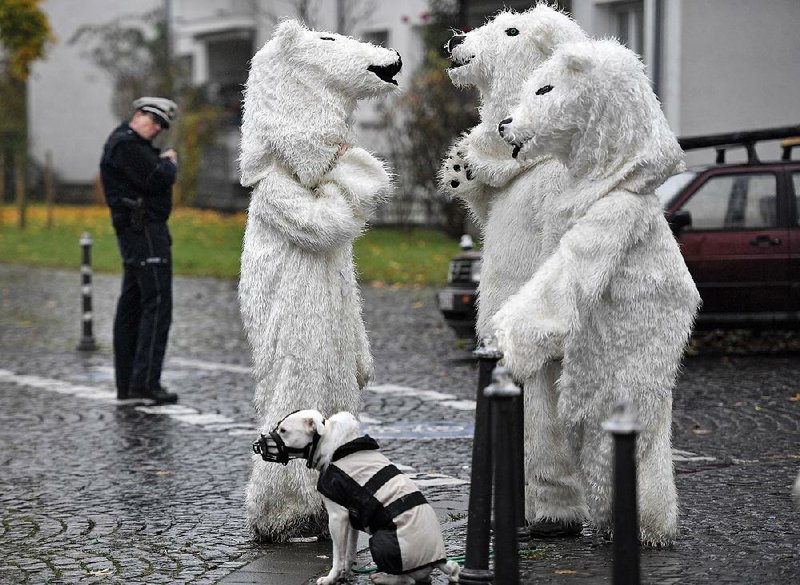BONN, Germany -- A group of U.S. states, cities, businesses and universities said Saturday that they are still committed to curbing global warming, even as President Donald Trump's administration is walking away from the Paris climate accord.
But the alliance, which has an economy larger than Japan and Germany combined, says it won't be able to achieve the necessary cut in greenhouse gas emissions without some efforts at the federal level.
"It is important for the world to know, the American government may have pulled out of the Paris agreement, but the American people are committed to its goals, and there is nothing Washington can do to stop us," former New York City Mayor Michael Bloomberg said at a global climate meeting in Bonn.
"We're in," said Bloomberg, who put more than $1 million toward funding the pavilion, according to his office. "Just because the federal government has chosen not to participate," he added in an interview, "the American public represented by its elected officials at other levels, by corporations, by universities, we understand that there's a problem, and we have to help solve that problem if we're going to have a future in this world."
[CLIMATE CHANGE: Charts, map on global warming]
Gov. Jerry Brown of California echoed those comments.
"In the United States, we have a federal system, and states have real power as do cities. And when cities and states combine together, and then join with powerful corporations, that's how we get stuff done," he said.
His speech was briefly interrupted by anti-coal and anti-fracking protesters, who held up banners and shouted "We're still in! Trump's still out!"
The group calling itself America's Pledge said states, cities and private groups have been taking considerable steps to reduce emissions by promoting renewable energy use and climate-friendly transportation systems.
"This is a pledge, and it's a pledge that you can cash, because it's real," Brown said.
"There's a debate in the United States between the denialists who pooh-pooh any thought about climate change and the catastrophic dangers it portends, and those who agree with the scientific academies of every country in the world that we're facing an existential threat and we have to do something about it," Brown said Saturday.
He and Bloomberg announced that the states, cities and businesses that had pledged to abide by the Paris accord were on track to meet the pledge by President Barack Obama's administration to cut emissions at least 26 percent below 2005 levels by 2025.
In a report, however, the group said that "we cannot underscore strongly enough the critical nature of federal engagement to achieve the deep decarbonization goals the U.S. must undertake after 2025."
Daniel Firger, one of the report's contributors, said it was intended to show that many in the U.S. aren't prepared to wait for Trump to change his mind on climate change again, or to wait for the next administration to tackle the issue.
"The good news around Trump's announcement to withdraw is that it has galvanized a groundswell of bottom-up support from all corners of the U.S. economy," Firger said.
Cities, regions and businesses in other nations around the world could look to the group for inspiration and support, he said, noting that the lessons learned by local authorities and businesses in the U.S. could be applied elsewhere.
The dueling U.S. delegations mirror a larger division within the United States over climate change. Trump's decision in June to withdraw from the Paris agreement was popular with his supporters. On Thursday, the State Department and the Interior Department sent high-level political officials to address a conference in Texas sponsored by the Heartland Institute, which rejects the scientific consensus that climate change is occurring and is primarily caused by human emissions. Scott Pruitt, the administrator of the Environmental Protection Agency, sent a video message of support.
"We have tremendous natural resources, from coal to natural gas to oil, to generate electricity in a very cost-effective way," Pruitt told the conference. "We should celebrate that and be good stewards."
Also on Saturday, German Chancellor Angela Merkel said in her weekly podcast that every country needs to pitch in to keep global temperatures from rising.
Merkel also said it's the responsibility of the industrial countries to develop environment-friendly technologies that are future-oriented, but "don't lead to a loss of jobs."
"We don't gain anything if steel mills, aluminum plants and copper mills leave our countries and go somewhere else where environmental regulations are less strict -- because then we haven't made any gains for world climate," she said.
Information for this article was contributed by Frank Jordans, Dorothee Thiesing and Kirsten Grieshaber of The Associated Press; and by Lisa Friedman of The New York Times.
A Section on 11/12/2017
